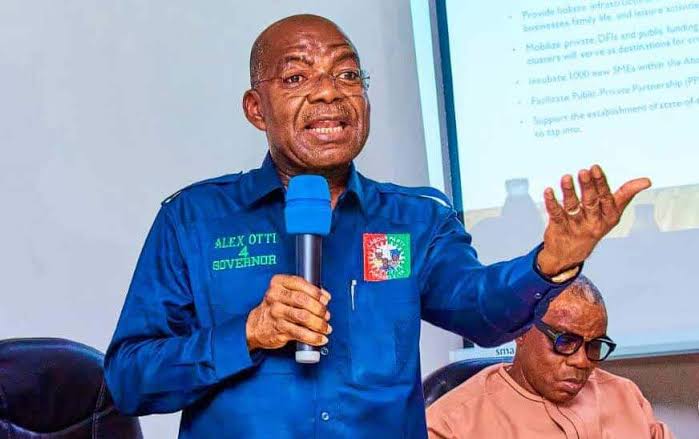IPOB Lawyer Ejiofor Raises The Alarm Over Herdsmen Invasion In South-East, Growing Siege, Threats | Sahara Reporters
Ejiofor decried what he called the “deafening silence” and “lukewarm responses” of political leaders and security agencies in the face of a growing security crisis across the South-East region.
Human rights lawyer and counsel to the Indigenous People of Biafra (IPOB), Barrister Ifeanyi Ejiofor, has said that the South-East region of Nigeria occupied by Igbos, is under siege with growing threat of herdsmen invasion.
Ejiofor decried what he described as a systematic and violent occupation of South-East communities by armed herdsmen, calling for an urgent, coordinated action to prevent further bloodshed and displacement in the region.
In a statement issued on Tuesday, Ejiofor decried what he called the “deafening silence” and “lukewarm responses” of political leaders and security agencies in the face of a growing security crisis across the South-East region.
He described an “existential threat” facing communities from Enugu to Ebonyi, Anambra to Abia, and Imo State.
“It is no longer news that Ala-Igbo, the ancestral homeland of the Igbo people, is under siege,” Ejiofor stated.
“What is deeply unsettling, however, is the deafening silence, the lukewarm responses, and the glaring reluctance by those entrusted with our security and well-being to address this existential threat with the urgency it demands.”
According to him, “Across our forests, farmlands, and rural communities, there is a growing and alarming systematic occupation by heavily armed, violent herdsmen, predominantly of Fulani extraction, who have turned vast portions of our land into terror enclaves.
“From Enugu to Ebonyi, from Anambra to Abia, and Imo State, chilling reports abound: killings, kidnappings, sexual violence, destruction of farms, and brazen extortion- targeted at our most vulnerable, farmers, women, and rural dwellers.”
Citing specific incidents, Ejiofor referenced a recent community meeting in Amansea, Awka North LGA of Anambra State, where local women were reportedly forced to plead with foreign herdsmen for access to their ancestral farmland.
He noted that even indigenous Hausa residents, who have lived peacefully in the region for decades, now express fear over the activities of these external groups.
“This is not mere speculation, nor a matter of rumor or hearsay,” he said.
“Just weeks ago, I received audio recording evidence and minutes from a distress meeting convened in Amansea, Awka, Anambra State, where our mothers, those who nurture the land and feed the region, were reduced to begging self-proclaimed “landlords”- foreign armed herders, occupying their ancestral farmlands, pleading for access to their own ancestral farmland.
“The heartbreak run deeper when even indigenous Hausa residents, who have peacefully coexisted with us for generations, equally expressed palpable fear and frustration over the activities of these external, armed invaders, acknowledging they too have become captives within a land that once welcomed them.”
He listed communities such as Uzo-Uwani, Isi-Uzo, Eha-Amufu, and Ihiala as flashpoints where reports of killings, kidnappings, sexual violence, destruction of crops, and extortion have become distressingly frequent.
He stated, “This disturbing reality is not isolated to Amansea. Similar cries for help are rising from Uzo-Uwani, Isi-Uzo, EHA-Amufu, Ihiala , and many other communities across Ala-Igbo, where forests are forcefully occupied, farms abandoned, livelihoods destroyed, communities silenced under the threat of violence.”
Ejiofor drew historical parallels to the Biafran War and warned against a repeat of what he termed the “painful genocide of the 1960s,” calling on every South-East governor to rise to their constitutional responsibility as Chief Security Officer of their state.
“We cannot afford another orchestrated annihilation in whatever form. Every South East Governor, as constitutionally empowered Chief Security Officer of their states must rise to this moment with courage and clarity,” he said.
While acknowledging infrastructural developments in some South-East states, he argued that “no edifice, road, or market can thrive on scorched earth,” and insisted that development without security is “hollow, unsustainable, and ultimately meaningless.”
He blamed the current escalation on the lack of enforcement of anti-open grazing laws, which several South-East states — including Abia, Ebonyi, Enugu, and Imo — have passed but largely failed to implement.
“The emboldened activities of these herdsmen are a direct consequence of failure,” he said. “How much longer shall we watch this time bomb tick?”
Ejiofor pointed to the example of Owerri, Imo State capital, where herders were recently seen grazing cattle in the heart of the metropolis without consequence.
According to him, “The emboldened activities of these herdsmen are a direct consequence of failure - failure to enforce the anti-open grazing and land protection laws that many states have already passed.
“It is more so when efforts by indigenous people to checkmate the activities of these marauders are being sabotaged.
“Multiple states in the South-East, including Abia, Ebonyi, Enugu, and Imo, have passed anti-open grazing legislation modeled after the landmark Open Grazing Prohibition and Ranches Establishment, yet, enforcement remains dismal, allowing invaders to grow in audacity and impunity.”
He warned that without decisive action, the region could experience the same scale of violence witnessed in Benue and Plateau States.
He urged the South-East to draw lessons from the South-West’s response, where local vigilance groups supported by state governments have resisted similar incursions.
“We must take inspiration from the quiet but firm community resistance in the South-West, where through local vigilance, state-backed frameworks, and community unity, have protected their lands from similar invasions,” Ejiofor stated.
“Their success shows us that lawful, organized community defence works, where backed with genuine resolve. All hands must be on deck to ensure the protection and safety of the entire Ala Igbo.”
Outlining a five-point action plan, Ejiofor called for full enforcement of anti-open grazing laws; legal strengthening of local vigilante groups; enhanced intelligence-sharing among communities; holding federal security agencies accountable, and documentation and international engagement on human rights violations.
He emphasised the need for South-East governors to form a united, non-partisan front to defend the region and secure its farmlands, forests, and people.
Ejiofor said, “The agricultural backbone of Ala-Igbo is collapsing under the weight of fear. Our mothers, fathers, and youths deserve the freedom to work on their lands without negotiating with terrorists.”
“The Igbo spirit is resilient, but now is the time to convert the resilience into decisive, coordinated action, let us protect our heritage, our dignity, and our future. The time to act is now,” Ejiofor declared.
The South-East region of Nigeria has faced increasing insecurity in recent years, including incidents of armed attacks on rural communities, rising kidnapping cases, and destruction of farmland allegedly by criminal elements posing as herdsmen.
In response, several states passed anti-open grazing laws aimed at curbing the movement of cattle through communities.
However, enforcement remains inconsistent, and rural populations continue to raise the alarm over worsening safety.
Follow the Sahara Reporters channel on WhatsApp: https://whatsapp.com/channel/0029VaFClvtH5JM6SSsP7M2Y












